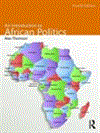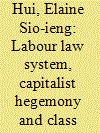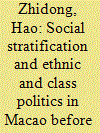| Srl | Item |
| 1 |
ID:
145906


|
|
|
|
|
| Edition |
4th ed.
|
| Publication |
Oxon, Routledge, 2016.
|
| Description |
ix, 298p.: tables, maps, platespbk
|
| Standard Number |
9781138782846
|
|
|
|
|
|
|
|
|
|
|
|
Copies: C:1/I:0,R:0,Q:0
Circulation
| Accession# | Call# | Current Location | Status | Policy | Location |
| 058715 | 320.9/THO 058715 | Main | On Shelf | General | |
|
|
|
|
| 2 |
ID:
146516


|
|
|
|
|
| Summary/Abstract |
This article investigates how the Chinese labour law system has helped to reproduce capitalist hegemony, i.e. the ethico-political, moral and cultural leadership of the ruling class. Based on intensive fieldwork in the Pearl River Delta and 115 interviews with migrant workers, this article shows that the labour law system has exercised a double hegemonic effect with regards to capital–labour relations and state–labour relations. Through normalizing, countervailing, concealing and transmuting mechanisms, the labour law system has been able to buffer both the market economy and the party-state from workers’ radical and fundamental criticism. However, the double hegemony mediated through the labour law system has influenced the Chinese migrant workers in an uneven manner: some of them have granted active consent to the ruling class leadership; some have only rendered passive consent; and some have refused to give any consent at all.
|
|
|
|
|
|
|
|
|
|
|
|
|
|
|
|
| 3 |
ID:
138448


|
|
|
|
|
| Summary/Abstract |
This article examines the changes in ethnic and class politics before and after the handover of Macao in 1999. Even though the domination of Macao politics has largely transferred from the Portuguese and Macanese to the Chinese, the former two groups still retain much power in the legal arena. The Chinese upper class played an instrumental role in Macao politics before the handover and became fully dominant after 1999. For example, they have maintained a large presence on the Executive Committee and in the Legislative Assembly, successfully prevented further democratisation, and protected their interests by delaying the legislation of a minimum wage and barring the collective bargaining power of workers. The working class’ main interests fall in the area of wage increases and protecting their jobs from imported labour. However, they would occasionally join forces with the middle-class movement for democratisation. This article uses statistical data from various sources and applies the critical approach in sociology, namely, historical-comparative analysis, to the study of ethnic and class politics. This analysis will shed light on a scarcely studied issue in Macao and its future prospects of democratisation.
|
|
|
|
|
|
|
|
|
|
|
|
|
|
|
|